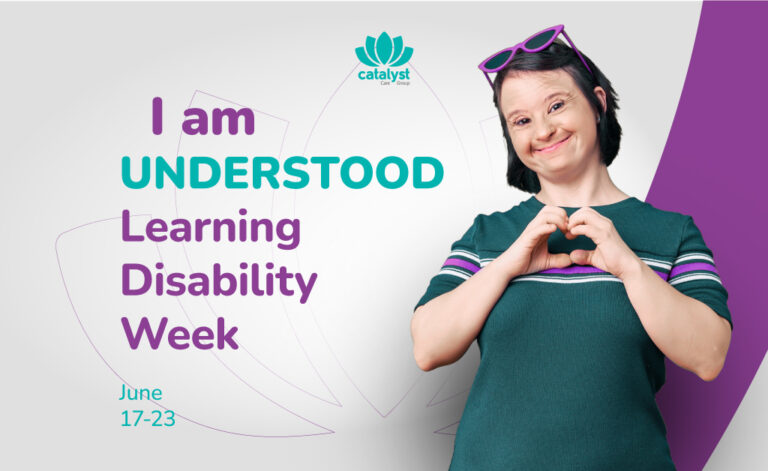In practice, Positive Behaviour Support strategies have shown outstanding results and positive outcomes for people with learning disabilities, autism, and mental health challenges.
What is Positive Behaviour Support (PBS)?
Positive Behaviour Support (PBS) is an evidence-based practice focused on understanding people who display behaviour that challenges. The approach is committed to providing personalised support to individuals to promote independence and improve their quality of life.
With Positive Behaviour Support strategies, people are given the opportunity to build self-awareness, develop beneficial coping mechanisms and reach new goals and aspirations. PBS is not solely focused on preventing challenging behaviour, it also strives to identify and understand the factors that might contribute to developing challenging behaviour.
Key Principles of PBS
The key principles of PBS are based on using proactive strategies to promote positive behaviour and minimise the risk of using restrictive practices. The primary focus of PBS is understanding the information the individual is trying to communicate through challenging behaviours.
There are several key principles of Positive Behaviour Support strategies, and they all create capable environments where individuals can thrive and be active participants in the community.
Based on our experience, these are the fundamental qualities of an effective PBS approach:
- Person-Centred Care. Putting the individual at the centre of the care journey, identifying strengths and abilities, and promoting the person’s dignity and autonomy.
- Positive Reinforcement. This principle involves acknowledging and rewarding positive behaviours, fostering learning, motivation and positive outcomes.
- Assessment-Based Interventions. By assessing strengths and weaknesses, these interventions are personalised, intentional, and effective in addressing a person’s challenges or goals. It helps maximise the individual’s quality of life by supporting people with a proactive approach.
- Prevention Instead of Reaction. Using proactive strategies to minimise the potential triggers of challenging behaviour and building supportive environments that promote positive behaviours.
- Outcome-Based Approach. Positive Behaviour Support is an outcome-based approach focused on providing positive outcomes and more independent lives for the people we support.
Developing a Positive Behaviour Support Plan
Positive Behaviour Support plans are developed with the help of the person in need of care and support, their family and loved ones, clinicians and other healthcare professionals. At Catalyst Care Group, we have in-house PBS teams of experts who can design a carefully tailored PBS plan based on a person’s unique needs, desires and experiences.
The main goal of every PBS plan is to understand and identify a person’s abilities and strengths, as well as challenges, fears, and things that may cause physical or mental pain. The next phase of a PBS plan involves building capable and nurturing environments where a person can feel safe, calm and fulfilled. Creating pleasant daily routines that drive positive change and support positive behaviour in people is the primary focus of a high-quality PBS plan.
With positive behaviour strategies, we maximise the use of proactive practices where an individual is constantly engaged in activities that give them a sense of meaning, and we minimise the use of active and restrictive practices. Also, every PBS plan is regularly updated and adjusted according to the person’s life changes.
PBS Stages
Positive Behaviour Support (PBS) involves three main stages: assessment, management and prevention. The aim of the PBS stages is to analyse and predict all the risk alternatives and maximise chances for success by providing this step-by-step framework. The following paragraphs explain the main stages of PBS used to manage challenging behaviour successfully.
Assessment Stage
The assessment stage involves a detailed and careful analysis of the person’s behaviour, environment and previous medical history. The process of trauma-informed care can also be applied in this stage, as we are aware that many people may exhibit challenging behaviour due to any kind of abuse or trauma experienced in the past. This stage also includes identifying a person’s strengths and characteristics, which form the baseline for further action.
Manage Stage
The management stage of Positive Behaviour Support (PBS) focuses on consistently implementing the behaviour support plan across different environments. This phase involves closely monitoring the individual’s progress, tracking the effectiveness of interventions, and making necessary adaptations to ensure the plan remains tailored to the individual’s needs and promotes positive behaviour change. Most importantly, this stage aims to provide solutions to re-direct the person and de-escalate behaviour before it becomes challenging.
Prevention Stage
As the name suggests, the prevention stage is focused on minimising challenging behaviour by preventing potential triggers. It’s a proactive and effective approach tailored to a person’s needs, providing them with resilience and alternative behaviour patterns to provide better outcomes and improve their overall quality of life.
Our PBS approach provides a human rights-based model of care, ensuring people with learning disabilities, autism, and mental health conditions are active participants in the community and that all their rights are being met and respected.

Maintaining Consistency and Communication
To implement Positive Behaviour support in practice, clinicians and healthcare professionals first need to build a strong and trusting relationship with the person receiving care. Effective and stable communication is the key to a successful PBS practice, while consistency is essential for maintaining quality and positive outcomes.
Positive Outcomes with PBS
Providing empathy, compassion and positive outcomes is deeply rooted in everything we do as an organisation. Through honest and transparent collaboration, we have managed to help a number of families who were struggling to find humanised support and a person-centred approach for their loved ones. Witnessing the smiles and peace of mind of the people we support during their toughest moments is a truly rewarding experience.
If you’re interested in witnessing the transformative power of Positive Behaviour Support and person-centred care that Catalyst Care Group provides to people with complex care needs, please take a look at our people’s real-life stories.
Catalyst Care Group Applies PBS in Its Practice
Providing person-centred and compassionate support is at the heart of everything we do. Through our Positive Behaviour Support strategies, Catalyst Care Group and our teams have successfully navigated crisis situations, enabled smooth transitions and prevented unnecessary hospital admissions. Our clinicians are trained in PRO-ACT SCIPr, a holistic approach for supporting people who experience challenging behaviour.
With our intentional and carefully designed behaviour support plans, we use proactive strategies to minimise the need for reactive and restrictive interventions.
- Functional and intentional assessment of challenging behaviour
- Creating evidence-based support strategies
- Providing regular and personalised training for teams supporting individuals
- Designing Positive Behaviour Support plans
- Multi-disciplinary and cooperative working in complex situations
- Fostering conversations and emotional support for our clinicians
As an organisation, we are committed to the Transforming Care Agenda rooted in the human-rights model of care. We are focused on keeping people as close to their home comforts as possible. Catalyst Care Group aims to work alongside colleagues across systems to find solutions for people in their own homes and communities, providing person-centred, high-quality support despite perceived limitations.
To work with us on building proactive, progressive solutions for people, get in touch with us.









